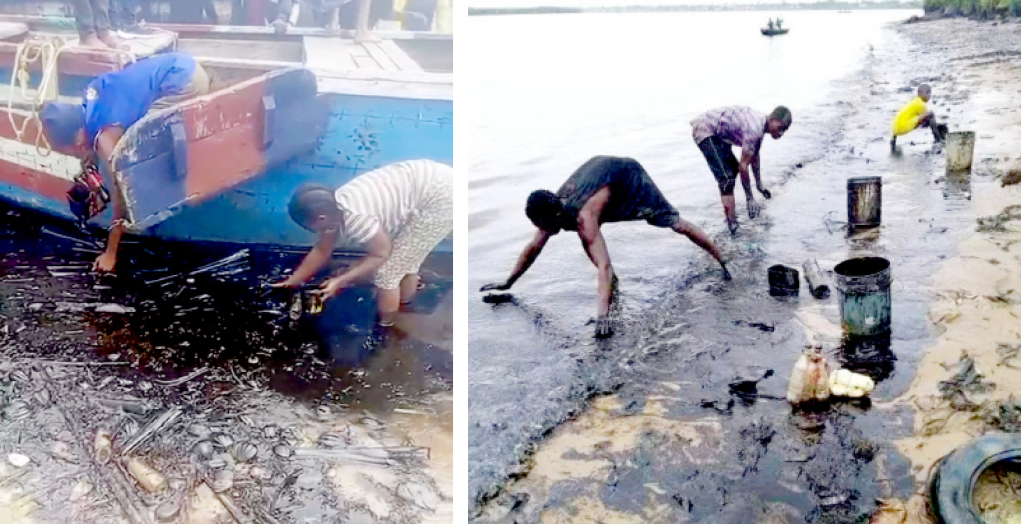The people of Akwa Ibom State have cried out over the attendant difficulties being experienced in various communities across the states following the August 2024 oil spill, which affected more than 27 coastal communities across Ibeno, Esit Eket and Onna local government areas of the state.
The residents said it is almost two months after the incident, yet the oil is yet to be cleaned-up, thus, allowing the water waves to wash the oil back into the sea and onto the land, causing further damage to the environment and the people’s means of livelihood.
Lamenting the annual occurrence, Effiong Ika, a boat owner and youth leader of Nnung Ukana in Mkpanak, Ibeno Local Government Area, Akwa Ibom State and ExxonMobil’s host community said the incidence has become like a norm to the people.
“I don’t do anything apart from fishing. When the oil spill occurs, you can’t get enough fish. The oil spill happens nearly every year. It happens always but nobody does anything about it, even to clean up; nobody cleans up,” he said.
The Village Head of Mkpanak, Obong Dennis Essenem, said they invited the Director General, National Oil Spill Detection and Response Agency (NOSDRA), Engr. Chukwuemeka Woke, to inspect the affected communities to ascertain the spill and take samples to determine the owner of the oil.
He said: “NOSDRA came and took samples of the oil, but up till now, no official clean up; not even the result of the sample that they took.”
Speaking on the effects of the oil spill, Essenem said the people suffer the consequences of having a polluted water source, unproductive farm lands and their means of livelihood taken away.
“When there is an oil spill, it will enter into the farm yards, into the creeks, spoil our environment, our crops, and aquatic animals.”
He said: “In this environment, because of pollution, we can’t drink water. We can’t dig bore holes because the water table is low, you need a professional drilling ship or truck. How many are ready to invest N30 million to drill a bore hole?”
Ibeno women leader, Obongawan Eta Ibok mentioned that the spill has grave implications for the family with regards to food and drinking water.
“The spill has affected women and children and fishermen. If it is raining now, you cannot drink water here. The water is rusty and not fit for drinking or to cook food” she said.
Spill killing farming culture
A farmer from Ibeno, Evangelist Imaobong Job, said the recurrent spill forced her to abandon her farms for networking business, noting that farm yields in the area were poor and discouraging.
“I am a farmer but this year, I made up my mind not to farm anything because the past two years I achieved nothing. You will bring good seed from other parts of the state, the same plantain that they harvest there with no much stress, you plant here, you will over work before you can get yield. When it’s time for harvest, the yield would be poor. I used to have a plantain plantation, but now if you come, you can’t see it again, the land is affecting it,” she said.
Job, who said God’s intervention was the last resort to the effects of the oil spill in the area, mentioned that women and children have been left to suffer, saying that when a woman’s source of livelihood is tampered with, the woman and her children particularly, would suffer.
“In the land of Ibeno, the pain is in series. If you go to the water side, you will see a lot of women frustrated. A friend went out to pick periwinkle, did you know the periwinkle was filled up with oil and you will perceive fuel in it. The whole place, even their hands, their nails are dead because of the negative effects of the oil spill.”
She said: “God blessed us with the sea, to make ends meet but now, nothing like blessings again. To me, I see it as a curse. Women are suffering greatly, menopausal aging is too early in this environment. A lot of women cannot calculate their menstrual cycle because of water pollution, air pollution, and land degradation.”
“When the oil is being drilled, sometimes, the houses vibrate so much that you will not be comfortable. Sometimes you will hear a loud bang; you will feel there is an earthquake. This environment really needs God’s intervention and I don’t think the government is helping,” she stated.
President General of Akwa lbom Oil Producing Community Development Network (AKIPCON), Dr Ufot Phenson said the current scarcity of sea foods in the market and the high cost of the available ones is due to the effects of the spill.
Phenson, who explained that the spill has affected the fishing trade as it is detrimental to the business, blamed the non adherence to the relevant laws as a problem.
“Today the fishermen would borrow to buy petrol, take to the sea, but on getting there, no catch. You’ll see oil floating on top of the water and if the oil traps the net, it would drag it to the seabed and the fishermen would return without a single catch and the money would be gone.
“That is why sea foods are very scarce. We blame this on oil companies. The government has made a series of laws and regulations, but the problem is adherence to those laws” he said.
Implications
Reacting to the health implication of the spill, Officer in Charge of Mkpanak Health Centre, Hope Samuel said respiratory diseases and skin problems would result from the use of the polluted water.
She affirmed that already, there have been increased cases of body rashes and high typhoid rate, adding that the facility recorded 19 cases within one month compared to other months before the spill occurred.
Speaking on the effects of non clean up of the environment, AKIPCON President General, Dr Ufot Phenson explained that the laws mandate that oil spills be cleaned and compensation paid to the community but unfortunately, the reverse is the case with the recent spill.
Phenson said there was no hope for the environment as long as spills are not cleaned, adding that the atmosphere was already toxic while wildlife is being scared away.
“The most responsible thing would have been to clean the oil because the more the oil is left unattended to, the more disastrous for the environment. They should have mobilized all oil companies within the area to clean the oil as a goodwill for the community and environment because it is our heritage.
“Akwa Ibom environment has been badly polluted with toxic, photogenic pollutions, night turning into day, scaring away wild life, incessant oil spills, if something is not done about it urgently, we may lose the environment, we need to protect it, it’s a critical factor of human right,” he stated.
Government interventions
The federal and state governments and even ExxonMobil are still singing discordant tunes about the spill.
The ExxonMobil through its Regional Communications Manager, Africa, Mr Ogechukwu Udeagha, insisted that the spill did not happen from its facility while the Uyo Zonal Coordinator of NOSDRA, Melvis Odobo, said samples of the oil are still being analysed and there would be an official statement from the agency when the investigation is concluded.
This has however not deterred the call for compensation by Mkpanak village head, Obong Dennis Essenem, who decried the lackadaisical attitude of the governments to their plight.
“The federal government should come and see how they are to compensate us with a lot of things,” he said.
In his reaction, the Chairman, Ibeno Local Government Area, Mr Emmanuel Ibom said the unresponsive attitude of the government to the spill is because they are a minority tribe without anyone to speak for them, despite his efforts to reach out to the relevant government bodies and agencies.
“We have suffered many decades of environmental degradation, which has had severe harmful impacts on our people. I have sent letters to all sectors of importance but to no avail. The last oil spill occurred, NOSDRA came, took samples and has not done anything about it till today. I am calling on IOCs, NOSDRA and even the state government to do something about cleanup in Ibeno,” he appealed.

 Join Daily Trust WhatsApp Community For Quick Access To News and Happenings Around You.
Join Daily Trust WhatsApp Community For Quick Access To News and Happenings Around You.


